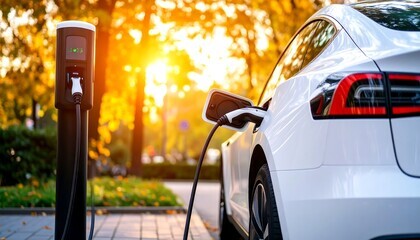The Role of EV Chargers in Achieving Sustainability Goals
Aug 6th 2025
As the world shifts towards a greener future, the adoption of electric vehicles (EVs) plays a crucial role in reducing carbon emissions and decreasing our reliance on fossil fuels. However, the success of EV adoption is closely tied to the availability and efficiency of EV chargers. These charging infrastructures are more than just conveniences for EV owners; they are key drivers in achieving global sustainability goals.
Reducing Greenhouse Gas Emissions
One of the primary sustainability objectives worldwide is reducing greenhouse gas (GHG) emissions. Traditional gasoline-powered vehicles are among the leading contributors to carbon dioxide (CO2) emissions. EVs, when charged with electricity from renewable sources, significantly cut down these emissions. Widespread deployment of EV chargers, particularly those powered by solar, wind, or hydroelectric energy, ensures that EVs remain a clean transportation solution.
Encouraging Renewable Energy Integration
EV chargers can act as a bridge between renewable energy and transportation. Smart charging stations, equipped with bidirectional charging and energy storage capabilities, enable EVs to function as mobile energy reserves. This allows for better grid stabilization and maximization of renewable energy use, reducing reliance on fossil fuel-generated electricity.
Supporting Urban Sustainability Initiatives
Many cities have set ambitious sustainability goals, including carbon neutrality and air pollution reduction. Expanding EV charging infrastructure encourages more individuals and businesses to transition to electric mobility, leading to cleaner air and reduced noise pollution. Additionally, strategically placed charging stations promote sustainable urban planning by integrating green energy solutions into public and private spaces.

Enhancing Energy Efficiency
Advanced EV charging solutions optimize energy distribution and consumption. Smart charging networks can regulate power demand based on grid conditions, avoiding excessive energy use during peak hours. This reduces strain on electrical grids, preventing blackouts and enhancing overall energy efficiency. Moreover, innovations like wireless and ultra-fast charging further improve user convenience and operational efficiency.
Driving Economic and Environmental Benefits
Investing in EV charging infrastructure contributes to job creation in the renewable energy and technology sectors. It also reduces dependency on imported oil, strengthening energy independence. Moreover, businesses that install EV chargers attract eco-conscious customers, reinforcing corporate sustainability efforts and demonstrating commitment to environmental responsibility.

Conclusion
EV chargers are indispensable in the transition to a sustainable future. By reducing emissions, promoting renewable energy, and enhancing energy efficiency, they play a pivotal role in global sustainability efforts. As technology advances and infrastructure expands, EV chargers will continue to shape the future of green transportation, driving us closer to a cleaner, more sustainable world.
Powering the future, one charge at a time.
At EVRetro, we are committed to making EV charging more accessible and efficient. Whether you're a business looking to install chargers or an EV owner seeking reliable charging solutions, we have the right products and expertise for you. Visit our website or contact us today to learn how you can be part of the electric revolution!

